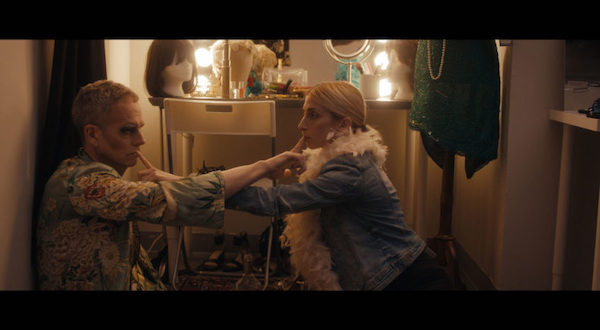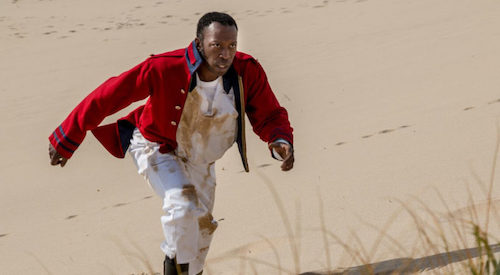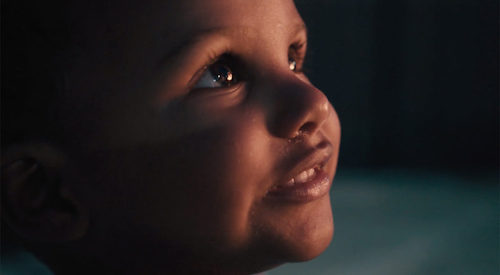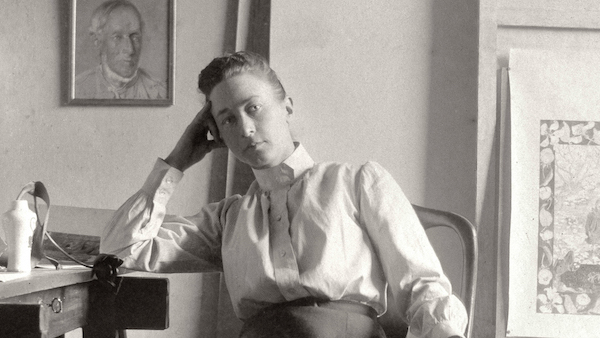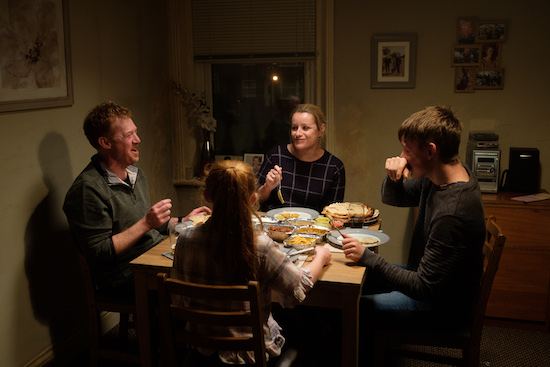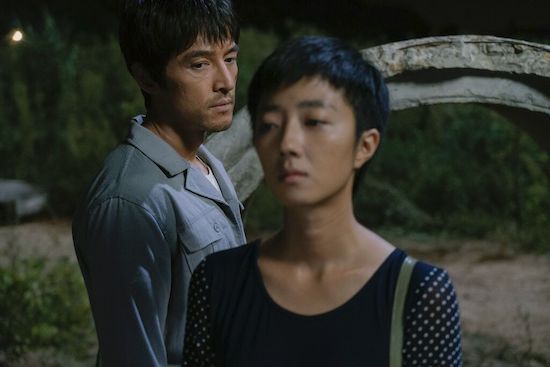- 5 years ago
-
Laverne Cox, courtesy of Netflix There’s a scene in Neil Jordan’s 1992 film The Crying Game in which Stephen Rea’s character vomits copiously after discovering that his love interest is not exactly the woman he thought she was. You might not recall that exact moment, but transgender people sure do. There’s a kind of homage to that scene in Ace Ventura: Pet Detective in which Jim Carrey goes way beyond vomit in response to a similar discovery. The latter is so over the top it could almost be a satire of stereotypical film reactions to transgender reveals, but it’s not quite.
Filmmaker Sam Feder has assembled those scenes and many others for the new Netflix documentary Disclosure, which charts the historical representation of transgender and non-binary characters in film and TV. Executive-produced by actress Laverne Cox (who is also interviewed in the film), Disclosure is entertaining, hard-hitting and often cringe-inducing. These often problematic screen depictions shaped not only general views of trans people, but how trans people feel about themselves.
There’s commentary from various entertainment figures including Chas Bono, Candis Cayne, Jen Richards, Yance Ford, Brian Michael Smith and Lilly Wachowski, who describe their own reactions to scenes such as the above-mentioned. Like any marginalized group, trans people always looked for themselves on screen, especially while growing up. According to several Disclosure interviewees, they embraced the few relatable characters presented, even if they or their storylines were questionable (Cayne’s character on “Nip/Tuck,” for example).
In researching the film, Feder took 100 oral histories from trans individuals who work in film and TV, and collected more than 1,000 clips from over 100 years of characters who traverse gender expectations. Though many aren’t technically transgender, especially in early films, these depictions added to many trans people’s overall self-identity.
Sam Feder
Photo: Alex SchmiderInterestingly, notes historian Susan Stryker, trans and cinema grew up together, with gender-fluid characters featured in films such as D.W. Griffith’s Judith of Bethulea (1914). Griffith, also responsible for the racist Birth of a Nation, featured characters who were both cross-dressing and in blackface, making for a double-whammy of insult. Ditto A Florida Enchantment (1914), considered the first film to feature cross-dressing/gender-nonconformity. As discussed in Disclosure, a black man in a dress was seen as especially emasculating, feminine clothes neutralizing the inherent “threat” he posed.
Along with Cox, several others interviewed in Disclosure are trans people of color, who make up a particular segment of those represented in media and in trans American life in general. (Many trans people who are victims of violence, on screen and in real life, are women of color.)
Disclosure features many familiar TV and movie clips, including characters such as Flip Wilson’s iconic Geraldine, played for big laughs. Trans and cross-dressing characters were often the butt of jokes, says Cox. In general we have been trained to laugh at trans people.
When not comic, trans characters have often been represented as dangerous and psychopathic, as in Dressed to Kill and Silence of the Lambs. Several of those interviewed in Disclosure admit they enjoyed the films at the time and only later realized how they internalized the revulsion elicited by these characters. Also disturbing for many is the fact that even progressive TV shows like the ground-breaking “The L Word” included offensive depictions of trans characters.
Unlike trans women, trans men are largely missing in media, note several Disclosure participants. For many, the appearance of Reno on Jerry Springer’s 1998 “My Boyfriend is a Girl!” episode was a defining moment: their first time seeing a black transgender man. On talk shows in general, there has been a salacious focus on body parts and surgery, shown via interviews of Carmen Carrera and Cox by Oprah and Katie Couric, both of whom became more sensitive in later interactions.
An especially moving Disclosure participant is veteran actress Sandra Caldwell, who did not come out as trans until very late in her career, having worked for years in fear of being found out.
There are so many interesting details, issues and points of view, along with myriad clips, packed into 105 minutes, that Disclosure can feel overwhelming in scope. Yet it’s tightly edited, so that it all pulls together coherently.
A welcome and timely addition to Pride Month releases, Disclosure is available on Netflix starting Friday, June 19.
—Marina Zogbi
Latest News
- 5 years ago
-
Milkwater Like many events these days, the 23rd edition of the Brooklyn Film Festival is going virtual. New York City’s longest-running international competition film fest, which runs this year from Friday, May 29, through Sunday, June 7, is offering a full lineup of over 140 films for free. (Viewers need only register.)
Planned many months ago, the theme of this year’s event is “Turning Point,” which takes on a whole new significance given the implications of the current pandemic. In addition to 15 narrative features and 10 documentary features, there are narrative and documentary shorts, experimental films and animation. The festival’s long-running rules: Participating films cannot be older than two years, films are selected from submissions only, all the selected films participate in the competition, and the smallest film can win the top festival award: The Grand Chameleon. In each of the six film categories, a panel of judges will select the Best Film, while the festival will select the Spirit Award, and the audience the Audience Award winners. There are also awards given for Best Actor, Best Actress, Best Composer, Best Style, Best Editor, Best Cinematographer, Best Screenwriting, Best Producer, Best New Director, and Best Brooklyn Project. The festival’s full slate of films can be found here.
A few highlights:
The Black Emperor of Broadway, directed by Arthur Egeli and written by Ian Bowater, is part of their Provincetown Trilogy collaboration, three narrative films set in the Bohemian community of Provincetown, Cape Cod. The film tells the true story of Charles Gilpin, the immensely talented African-American actor who starred in Eugene O’Neill’s The Emperor Jones in the 1920s. Though the film is a bit stagy and is marred by an overly dramatic soundtrack, it’s buoyed by its excellent actors, especially Shaun Parkes as Gilpin. It’s also a fascinating narrative of the time, including the thorny relationship between the principled Gilpin, who chafed at the play’s racist language, and O’Neill (John Carter Hensley), who–like many playwrights–felt that his words were sacrosanct.
Black Emperor of Broadway Higher Love, directed by Hasan Oswald, is a gritty documentary about Daryl Gant, a Camden, N.J., father of eight who tries repeatedly to help Nani, his crack-addicted girlfriend and the mother of his son. A third major character is Iman, a dealer-turned-addict who attempts to get clean with the support of his multi-generational family. The film features several other locals, many of whom are either part of Camden’s addict community or their relatives. Oswald managed to obtain incredibly intimate access to his subjects, especially Daryl, so that we’re privy to the latter’s frustrations and failings (he occasionally drinks too much), as well as his unflagging determination to help Nani, and his love and concern for his children. Nani and her fellow addicts are shown in the throes of their addiction, helpless to help themselves. Sad and sobering.
Higher Love Milkwater, a comedic drama written and directed by Morgan Ingari, is a likable, assured first feature staring Molly Bernard as a single young Brooklynite who decides to become a surrogate for an older gay man. Milo is a funny, outspoken sort who feels left out when her best friend (Ava Eisenson) has a baby with a wife who seems immune to Milo’s humor. After befriending part-time drag performer Roger (Patrick Breen) in a bar, Milo impulsively offers to have the baby he’s wanted for years. However, the duo have different ideas about their relationship, worsened by her boundary issues and general excessive drinking. (Alcohol plays a prominent role in this movie.) Bernard is perfect as the expressive, exasperating Milo and Breen is solid as the more centered Roger. What could have been a predictable premise turns out to be an engaging film, complete with supporting characters (a trio of “High Fidelity”-like guitar store clerks) and situations (drag night) that call for more screen time. The film feels like a long pilot for a Netflix series, which is not a bad thing.
—Marina Zogbi
- 5 years ago
-
Zeitgeist Films We may not be able to see movies in actual theaters these days and the release dates of many films have been pushed back, but some distributors are working around our current COVID-19 lockdown.
Arthouse and international film distributor Kino Lorber has recently expanded its virtual theatrical exhibition program Kino Marquee into 150 theaters nationwide. This streaming initiative enables local movie theaters shuttered by the coronavirus outbreak to continue serving their audiences while generating some revenue. Film lovers are able watch spring releases while supporting their favorite theater.
Opening on Friday through the websites of various theaters across the country is Beyond the Visible: Hilma af Klint, Halina Dyrschka’s documentary about the revolutionary Swedish artist. What a great time to immerse oneself in the fantastical world and stunning visuals of af Klint’s work. On the other hand, it’s unfortunate that the film isn’t get the big-screen release it deserves. (Hopefully in the future?)
Beyond the Visible is foremost a depiction of af Klint’s unusual life, but it’s framed by the bigger issue of her undervaluation and near-anonymity until recently. Though Vasily Kandinsky has generally been credited as the first abstract artist, the film makes clear that af Klint was creating abstract works years earlier. Yet, many in the U.S. had never heard of her until a retrospective was mounted in 2018 at the Guggenheim, an amazing show that drew huge crowds.
Zeitgeist Films Dyrschka calls upon various art critics, historians and curators, as well as Hilma af Klint’s descendants to discuss her unique (to put it mildly) perspective and the ways in which her art has been ignored by the art world. A repeated theme: Is it possible to re-write art history? The answer isn’t exactly a resounding yes.
Af Klint was born in 1862 to an aristocratic family of naval officers in Sweden. Supported in her creative pursuits by her father, she attended Stockholm’s Royal Academy of Fine Arts, where she first channeled her talent into naturalistic, botanical works. Fascinated by the natural world, she breached tradition by painting nudes and refusing to beautify portraits. From early on, she was interested in more than just art; her goal was no less than understanding human existence and life itself. She wanted to show more than the visible. Her extraordinary abstractions were attempts to depict atoms, quantum theory, DNA, and other biological and scientific processes.
Zeitgeist Films Like many of her era, especially women, she became interested in spirituality, attending seances and other gatherings of like-minded seekers. Female artists have traditionally been underrepresented in the art world; the fact that af Klint was inspired by spiritualism pretty much ensured that her work would be kept out of museums. The film disputes various assertions that she did not exhibit in her lifetime, another excuse given by museum curators to ignore her paintings. Upon her death in 1944, af Klint’s nephew Erik inherited an astounding 1,500 paintings and 26,000 book pages of her art. It wouldn’t be until almost 50 years later that the works would come to light and the artist recognized as the pioneer she was.
Beyond the Visible is generous with af Klint’s eye- and mind-boggling art, presenting a vast array of her paintings both on their own and in gallery settings. From the huge, luminous, pastel-hued “The Ten Largest” series to smaller, monochromatic schematic works, her works are both beautiful and mysterious, spanning decades and themes. It’s clear that she not only had an utterly unique vision—or visions—but she worked tirelessly to bring them to life. Whether she’ll ever get the credit she deserves is another story.
Beyond the Invisible: Hilma af Klint opens on Friday, April 17. Click here to access the film and support local theaters.
—Marina Zogbi
- 5 years ago
-
New York City based non profit Art for Progress has launched an online music resource for NYC students and anyone who’s interested in learning how to produce music, play an instrument or vocal instruction.
In response to the school closures and what seems like the inevitable end of the school year, Art for Progress is taking a progressive approach to providing instruction for our students in both our elective music classes, after school programs and our BREC campus wide after school music program.
To address this challenge, we will be providing weekly educational videos that will align with what was being taught in the classrooms prior to the school closures- instrument instruction, vocal instruction and music production. New content will be posted along with a narrative for each video, and our teachers will be available to take questions, arrange chats and for follow up meetings.
We expect to launch the online program on Monday, March 23rd and as we come up with more creative ideas we will continue to add more to the program. At this point, we will provide as many resources as possible to be sure that this is the best experience we can provide outside of the classroom.
We’re excited to do this for our students and for anyone who wants to learn through this new resource. For any inquiries, please contact admin@artforprogress.org.
Please subscribe to the channel and follow us here: https://www.youtube.com/channel/UCbEUTEdVVFNtY49A7D01-ZA
- 5 years ago
-
Courtesy of Zeitgeist Films in Association with Kino LorberKen Loach, Britain’s filmmaker laureate of socially conscious movies, often depicting working-class families, has created an emotionally wrenching, beautifully realized drama with Sorry We Missed You. What better times than this trying era for Loach, whose clear-eyed focus on the underclasses has driven his work since 1967’s Poor Cow.
He takes on the exploitation and false promises of the gig economy in his latest film, which opens with Ricky (Kris Hitchen), an unemployed father of two from Newcastle, interviewing for a van driver position with a company that’s an unholy cross between Amazon and Uber. As a franchisee he’ll receive no wages, no contract, and no regular hours. “Like everything around here, it’s your choice,” says Ricky’s future boss, Maloney (Ross Brewster), regarding the decision to buy a van or rent one from the company. Ricky opts to own, even though he and his wife Abbie (Debbie Honeywood) are already in debt. There’s the dangling carrot of major money to be made, but we can already see that the couple are on a hellishly slippery slope, and not just because this is a Ken Loach movie.
Courtesy of Zeitgeist Films in Association with Kino Lorber For her part, good-natured Abbie works tirelessly as a home health aide, visiting clients who need to be fed, cleaned and otherwise taken care of. Though the work can be frustrating, grueling and downright disgusting, Loach is careful to show the individual personalities of those Abbie cares for, several of whom are embarrassed and dismayed by their plights, while almost all appreciate her efforts. Similarly, Ricky has a few pleasant interactions with recipients of his deliveries, though others prove difficult and uncooperative, especially frustrating when his every working minute is being clocked.
Ricky’s workplace garage is horribly stressful, with unreasonable delivery quotas to be filled, no time for bathroom breaks (drivers carry empty water bottles) and a hard-as-nails boss who is unremittingly caustic, often pitting drivers against each other in the struggle for a more lucrative route. Any show of slowness or weakness is cause for harsh ridicule.
Courtesy of Zeitgeist Films in Association with Kino Lorber Meanwhile, the couple are raising two children, the mature and reasonable tween Liza and slightly older Seb. With both his parents working longer hours and too exhausted to really be present when they are home, Seb soon begins staying out late and getting into trouble, making infuriating, typically teen-rebellious decisions that threaten to topple an already fragile family dynamic.
Ricky and Abbie have an affectionate relationship, but mounting job pressures cause them to snap at each other, mainly about handling Seb. “I never thought it would be this difficult,” says Ricky at one point, doubtless echoing millions of others in similarly difficult economic situations.
Though there are warm moments when the family comes together, tensions continue to escalate until stakes are so high that we can barely breathe, hoping that somehow they can through this soul-destroying time.
Sorry We Missed You is both sweet and devastating, the work of a filmmaker who knows exactly how to tell his story for maximum impact.
Film Movement Also opening this week is Diao Yinan’s The Wild Goose Lake, a darkly languid, noir-ish film that packs an unexpected punch. Shot in and around the city of Wuhan (before it was virus-besieged, lending the film an unintended air of melancholy), The Wild Good Lake is a stylish gangster tale that is familiar, yet wholly novel.
Part of an underworld of gangs and motorbike thieves, Zhou Zenong (a charismatically brooding Hu Ge) is on the lam after accidentally killing a cop. Attempting to elude the gangsters and police that are chasing him while trying to reconnect with his estranged wife, Zhou meets a coolly enigmatic young woman (Gwei Lun-mei) who has her own reasons for helping him.
The maze-like, rain-slicked streets and neighborhoods of the city are the backdrop for the manhunt, which is punctuated by tense encounters and wittily baroque violence. By the end of this twisty tale, the characters have somehow gotten under our skin; Diao’s film is surprisingly resonant.
Sorry We Missed You and The Wild Goose Lake open at the Film Forum on March 4 and March 6, respectively.
—Marina Zogbi



